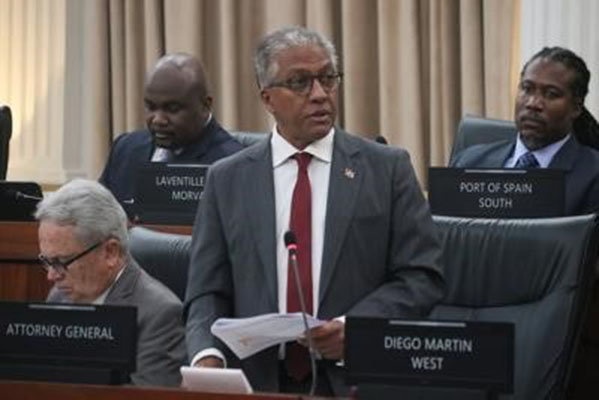(Trinidad Express) ATTORNEY General Reginald Armour is expected to take a Note to Cabinet “soon” to make certain amendments to the Emergency Powers Regulations (2024) after a legal challenge was filed by attorneys representing blogger and activist Vishal Persad.
This was revealed by senior counsel Russell Martineau yesterday afternoon during a virtual hearing of the claim before Justice Westmin James.
While Martineau did not give a specific date when Armour would actually be taking the Note to the Cabinet, he informed the court that the Attorney General had given him instructions that it would be done soon.
This resulted in Justice James adjourning the matter to March 8 for an update on whether the amendment had actually been made.
Attorneys Kiel Taklalsingh, who along with Kristy Mohan and Keron Ramkhalwhan, filed the constitutional claim on behalf of Persad, submitted that once the amendment was made, he would then withdraw the claim.
In addition, Taklalsingh said his client would not be seeking to recover any legal costs, given that the matter was brought in the public’s interest.
On January 1, the attorneys had issued a pre-action protocol letter to the AG’s Office and President Christine Kangaloo calling for the amendments to be made.
According to the attorneys, parts of the regulations are unconstitutional in that they give police officers and members of the Defence Force the power to arrest citizens and have them remain in custody for extended periods for trivial reasons.
They claimed that some of the basic constitutional rights of citizens can be trampled upon based on the regulations as they currently stand. While the attorneys made it clear that their client was not opposed in any way to the declaration of the state of emergency (SoE), they said Persad had concerns over the sweeping powers of the police and military.
Persad’s main concern had to do with the use of the words ‘public order’, which he said were not clearly defined in the regulations.
The attorneys pointed out that on December 31, when then-acting AG Stuart Young and National Security Minister Fitzgerald Hinds officially announced the declaration of the SoE, it was specifically stated that the purpose of the SoE was to address individuals who pose a threat to public safety, particularly those involved in criminal activities and the illegal use of firearms.
When it came to regulations 12, 14 and 2 of the schedule that deals with public order, the lawyers said citizens can be arrested for simply voicing their opinions against Government or the Executive.
The specific regulations Persad is challenging are:
• Regulation 12 (a): No person shall endeavour, whether orally or otherwise, to influence public opinion in a manner likely to be prejudicial to public safety and order.
• Regulation 14 (1): A police officer may arrest without warrant any person whom he suspects has acted or is acting or is about to act in a manner prejudicial to public safety or to public order or to have committed or is committing or is about to commit an offence against these Regulations; and such police officer may take such steps and use such force as may appear to him to be necessary for affecting the arrest or preventing the escape of such person.
• Regulation 2: The Minister may, if satisfied with respect to any person that, with a view to preventing him acting in any manner prejudicial to public safety or public order or the defence of Trinidad and Tobago, it is necessary to provide for his preventive detention, make an order—(a) directing that he be detained; and (b) stating concisely the grounds for such detention, so however, that no defect of any kind on such statement shall invalidate the order.
Stifling ‘free speech’
In the pre-action letter, Persad is contending that the inclusion of “public order” in the Regulations go too far in that the term is likely to capture trivial acts that could not reasonably be regarded as prejudicial to public safety.
“In other words, the term public order could be wielded by the Executive as a broad sword to cut down the citizens’ rights to severely criticise the Government and/or the Executive through the use of freedom of speech.
“This is particularly germane when one considers the inclusion of Regulation 12 (a) which specifically seeks to prohibit speech. Indeed, in the hands of an overzealous police officer a citizen could be arrested or detained for merely criticising the Government and/or the police service for its handling of crime,’ the letter stated.
The letter went on to add that the regulations associated with the current SoE introduce the term “public order”, but notably, this term is not specifically defined within the legislative framework.
“In essence, this regulation gives the Executive an unchecked ability to target and detain individuals for trivial acts or merely for expressing their political beliefs, all of which may fall within an arbitrary definition of maintaining public order, which is particularly dangerous in an election year where criticisms against the Government and/ or the Executive is expected to be virulent and scathing,” the attorneys added.










